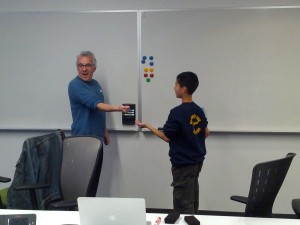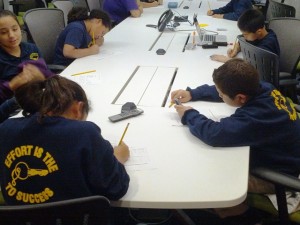Googlers Teach the Math Behind the Magic
Do you think you know more than a 6th grader about math? Don’t be so sure, thanks to Google volunteers who are teaching middle school students how to stump the professionals. Once a week for ten weeks Bob Cassels and Nick Minutillo took time out of their day to inspire students to love math. We sat down with them to talk about their experience in the classroom...
CS: What was the topic of your class and what did the students learn?
 Nick: During the "apprenticeship" class we taught the students math through secret codes, games and magic. The kids learned the math behind card tricks and cracking codes. At the end of the semester the students had a chance to show what they had learned to a group of engineers. The theme was to see if they could stump the engineers and the students were very well-prepped. They knew they were guaranteed to win because they knew the math behind the experience. In one of the groups an engineer lost the game to a student and the student said, “I want your job!” They really wowed the crowd.
Nick: During the "apprenticeship" class we taught the students math through secret codes, games and magic. The kids learned the math behind card tricks and cracking codes. At the end of the semester the students had a chance to show what they had learned to a group of engineers. The theme was to see if they could stump the engineers and the students were very well-prepped. They knew they were guaranteed to win because they knew the math behind the experience. In one of the groups an engineer lost the game to a student and the student said, “I want your job!” They really wowed the crowd.
Bob: The kids developed public speaking skills too. They had terrible cases of stage fright at first but played through it and broke out of the their shells. Some of the kids brought their parents to the event and the parents were very impressed to see their kids at Google interacting with adults in a very mature way.
CS: What made your apprenticeship experience a success?
Bob: If anyone says our class was a success it’s because we had nine wonderful kids. They were bright, curious and engaged with the material. They were thrilled when we took them to Google on a field trip. When you work here, it’s easy to forget that Google is a big brand, and when kids enter the building it’s automatically cool to them and they know it must be interesting to work here. I believe that all kids are naturally curious about mathematics and science. Sometimes the traditional non-recreational school day can dull that curiosity. Our goal was to invigorate it.
Nick: All of the support from Citizen Schools freed us to talk about math with the kids and not worry about the logistics. We got a lot of good input from our Teaching Fellow staff partner who suggested things like getting the kids up and moving instead of sitting still. We would email the lesson plan to him on Saturdays and by Sunday he would email back a much better plan based on what he knows about the individual students. He was always right! He taught us the idea of hooking the kids in from the start. There was no time to wonder whether the lesson was going to be fun, because it always started out fun thanks to his expertise.
 CS: What did you learn about the students from this experience?
CS: What did you learn about the students from this experience?
Nick: If you teach a science, technology, engineering or math (STEM) apprenticeship you’ll discover that the kids are just really curious. We had an open Q and A session one day and the students love the game of trying to stump us. The questions they asked were serious science questions. They have this pent up curiosity filled with the desire to be exposed to this content.
CS: What was your WOW! or “aha” moment from the semester?
Nick: During the WOW! one of the kids said he had seen a show on the Discovery channel and had a bunch of questions about astronomy. As it turns out I had a friend there who had a lot of astronomy knowledge. They had a great conversation and my friend was really impressed with the student’s level understanding and interest. I realized the importance of providing kids an outlet for their curiosity.
Bob: One young girl would tell us that she didn’t like math, but she literally could not resist to participate in the lessons because of her curiosity. On the first day of class she was very standoffish and she wouldn't raise her hand. I imagined she thought it was nerdy and not cool enough. When we started doing the secret codes she insisted on being the first to raise her hand, shouting, “I know! I know!” Watching a student getting sucked in to what you think is interesting is really fun.
CS: Why do you think mentoring students is important?
Bob: We can give them opportunities they don’t normally have. Science sometimes gets short shrift in school but kids are desperate for more science. Googlers who want to teach will discover these deep pools of curiosity in the kids and they can have a real impact by unlocking it.
